This project aims to improve the traditional water mills by replacing wooden equipment in order to make them more efficient and to demonstrate the importance of the technology in the mountainous region. Furthermore, the supply and demand gap of products (such as grains) processed by the water mills could be closed by efficient production and effective marketing.
 The mountainous state of Uttarakhand is well known for its rivers and streams, which are directly or indirectly fed by the surrounding Himalayan peaks. For many years, the inhabitants of these regions have been harnessing the river water for the supply of drinking water, irrigation, hydro power generation and other activities. There are an estimated 15,000 traditional water mills in the state of Uttarakhand, of which only 65% are in operation and 10% are reported to be totally defunct.
The specific objectives of the project are:
The mountainous state of Uttarakhand is well known for its rivers and streams, which are directly or indirectly fed by the surrounding Himalayan peaks. For many years, the inhabitants of these regions have been harnessing the river water for the supply of drinking water, irrigation, hydro power generation and other activities. There are an estimated 15,000 traditional water mills in the state of Uttarakhand, of which only 65% are in operation and 10% are reported to be totally defunct.
The specific objectives of the project are:
- To identify existing and potential livelihood activities that could use the mechanical and/or electrical output available from improved water mills in the district of Uttarakhand
- To facilitate capacity building and training for the owners of the selected water mills
- To facilitate the upgrading of the selected water mills
- To establish marketing opportunities for the products processed by the water mills
Projects with same technology
Demonstration of Sustainable Low Head Pico-Hydro to Deliver Enhanced Rural Energy Services to the Terai Region of Nepal
To demonstrate feasibility of a low-head propeller turbine in low-lying unelectrified communities
Developing Alternative Sustainable Income-Generating Activity by the Efficient Use of Surplus Energy From an Existing Micro-Hydro Plant
This project aims to pilot a water lifting technology for irrigation and an associated off-season vegetable farming enterprise
Projects in same country
Energy efficiency improvement of city street lighting in India
To demonstrate the energy saving potential which exists in city street lighting system by retrofitting a part of existing street lighting system